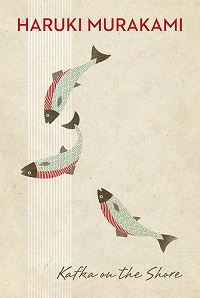We are hungry for it, but we fear it so much. Bend space and transcend time, no worries, but don’t ascribe it real meaning.
 Haruki Murakami.
Haruki Murakami.
This month I read for the first time an author I had heard a lot about, the celebrated Japanese writer Haruki Murakami.
Kafka on the Shore tells the story of “the world’s toughest fifteen-year old,” Kafka Tamura, who runs away from home. The chapters alternate to tell also the story of Mr. Nakata, an elderly man who suffered an accident as a boy and became mentally disabled. Mr. Nakata has the ability to talk with cats and make fish fall from the sky. Kafka has sex with women he suspects are his mother and sister, and, through an entrance opened by Mr. Nakata, ventures to a place that is not well-defined, something of a parallel dimension or limbo. Another character collects cats’ souls and, this is not clear either, apparently survives death.
Weird stuff, in other words. But at the same time, in Murakami’s telling, the story moves along in a plausible and straightforward way. As the novel progresses, strange things happen but there is nothing overtly spiritual or supernatural. There are no gods, spirits, or aliens. Instead, the magical just happens. It is a part of the story just as the characters’ eating and talking.

I’ve found it a curious, thought-provoking tale. It reminded me of a genre called magical realism (though different scholars would place Murakami in other genres) where, according to Google’s definition (c’mon, I can transgress some boundaries too!) the extraordinary is portrayed as ordinary in a way that invites alternative readings of reality.
Magical realism is a fiction genre in which magical elements blend to create a realistic atmosphere that accesses a deeper understanding of reality.
Reality is more than what we can see and touch, seems to be the message. It transcends the material but let’s not get carried over to prayers or overt religious claims, people.
The book got me thinking about our complex relationship with the spiritual. We are hungry for it, but we fear it so much. Bend space and transcend time, no worries, but don’t ascribe it real meaning. So much of our literature and cinema today takes us beyond the ordinary world–fantasy, science fiction, horror, mystery – but what’s the point? Maybe the point is that there is not much of a point. Or that the point is out there but we can’t see it. Or that art is about not having a point. Or that to look for the point is to miss the point. Or that we want to look for the point but not find the point. Or something like that.
“You’re part of a brand-new world,” is Kafka on the Shore’s last sentence.[1] Yes you are, even if you or I or anyone can’t really describe what it is. Well, maybe a little.
[1] Haruki Murakami, Kafka on the Shore (New York: Vintage, 2005), 489.

Las opiniones vertidas por nuestros colaboradores se realizan a nivel personal, pudiendo coincidir o no con la postura de la dirección de Protestante Digital.
Si quieres comentar o